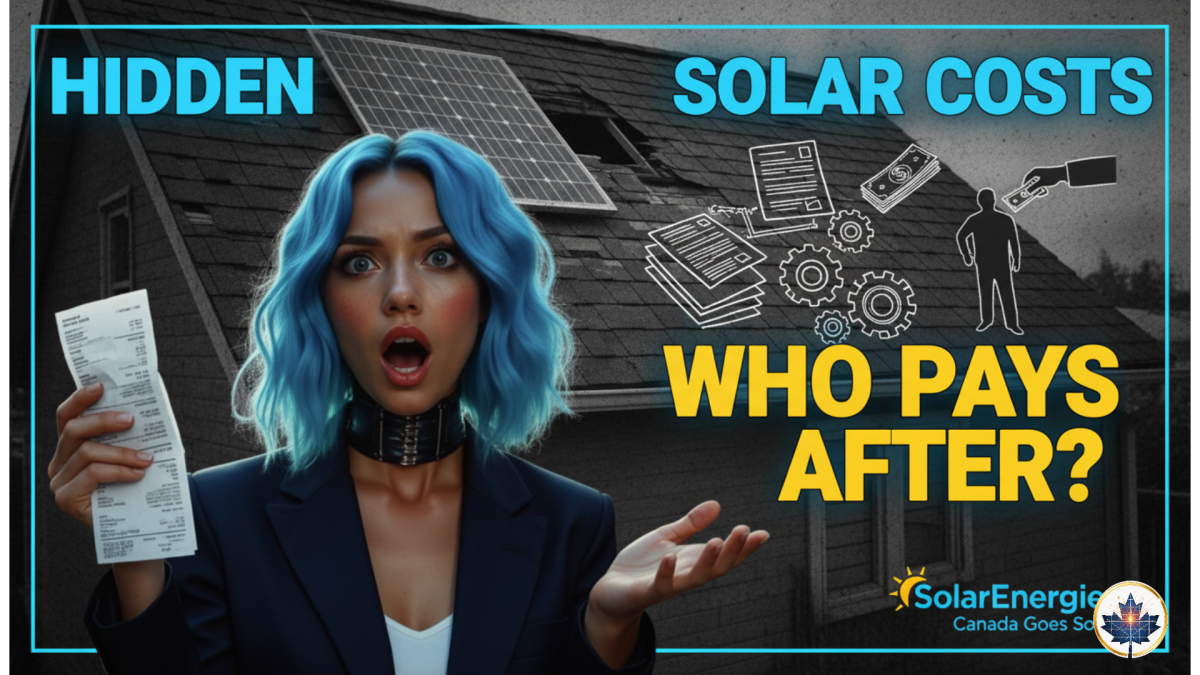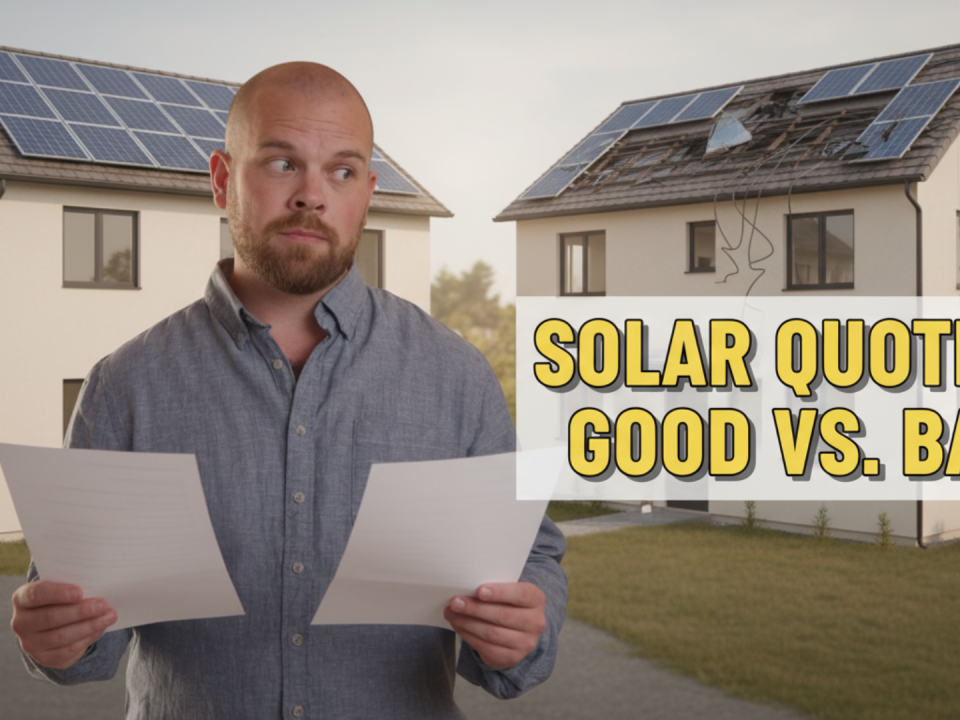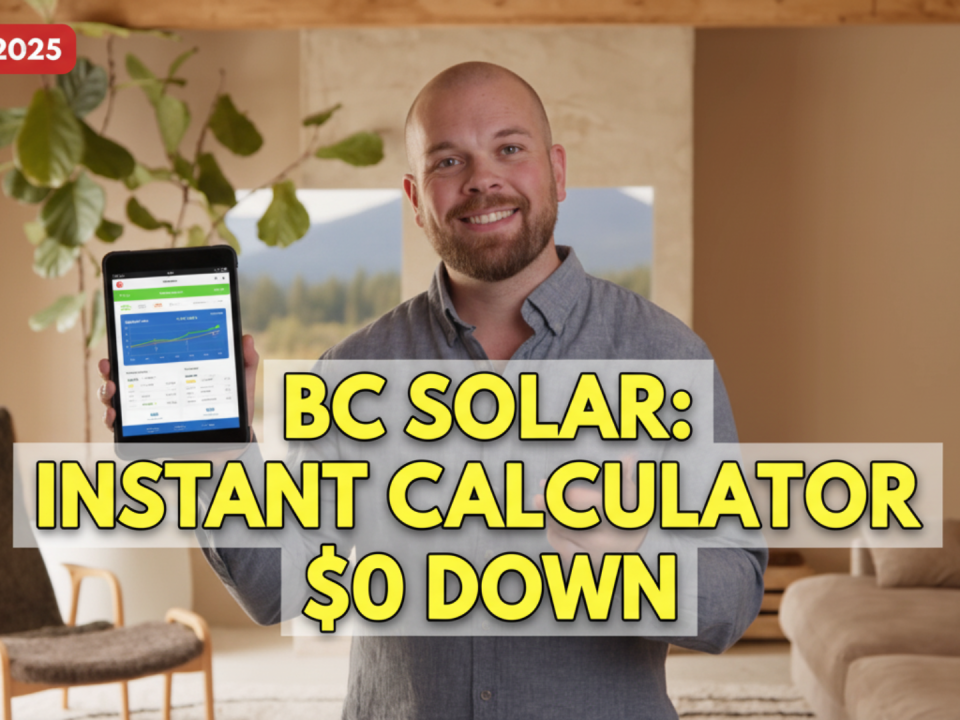
Do Solar Panels Pay For Themselves in Canada? Provincial Rating
September 10, 2025
Is Canadian Solar’s New Tech a Game-Changer? The Real Price & Process Breakdown
September 11, 2025So, you’ve got a quote for a solar panel system in Nova Scotia. It looks great, the savings seem clear, and you’re ready to start producing your own clean energy. But hold on a second. That number on the page, the one that seems to cover everything? It often doesn’t.
I’m Vitaliy Lano, and at SolarEnergies.ca, we’ve spent years looking at how these projects really come together. What I’ve seen time and again are homeowners getting surprised by a series of smaller, but significant, costs that pop up after they’ve signed on the dotted line. These aren’t scams or tricks; they are just a standard part of the process that somehow gets lost in the sales pitch.
Let’s pull back the curtain on the three main costs that your initial quote might not be telling you about: permitting, inspections, and interconnection fees. We’ll look at what they are, how much they can set you back, and who actually ends up paying for them.
Unpacking Your First Hidden Cost: Permit Fees
Before a single solar panel can be installed on your roof, your installer needs to get permission from your local municipality. This comes in the form of a building and/or development permit. Think of it as the official green light to start the work.
Why Does Your Solar Project Need a Permit?
Permits are all about safety and compliance. Your municipality needs to ensure the proposed solar installation meets the National Building Code of Canada and any local bylaws. They are checking things like:
- Structural Integrity: Can your roof actually handle the added weight of the solar panels and racking, especially with a heavy Nova Scotia snowfall? An engineering assessment might be required, particularly for older homes.
- Electrical Safety: Is the system designed to integrate safely with your existing electrical panel and the grid? This is about preventing fires and ensuring the system is up to code.
- Zoning and Setbacks: Does the placement of the panels comply with local land-use bylaws? There might be rules about how close the panels can be to the edge of your roof.
Permit Costs in Nova Scotia: What’s the Price and Who Pays?
The cost of these permits varies significantly across Nova Scotia. In the Halifax Regional Municipality (HRM), for example, a building permit for a solar installation can run you between $150 and $300, depending on the project’s value. In other municipalities, the fee might be a flat rate or calculated differently. A 2022 report by the Canadian Renewable Energy Association noted that inconsistent permitting fees across the country can add unexpected costs for installers, which often get passed on to the customer.
Tip for Homeowners: Ask your solar installer upfront if the cost of permits is included in their quote. A reputable company will be transparent about this and should handle the entire application process for you. It’s a red flag if they ask you to secure the permits yourself.
The installer typically pays this fee initially, but you can be sure it’s baked into your total project cost. It’s an administrative cost of doing business for them. The pain point here is less about the fee itself and more about the time it takes. Delays in permitting can push back your installation date by weeks, sometimes even months, leaving you waiting.
Next Up: The Mandatory Electrical Inspection Fee
Once the installation is complete, but before the system can be turned on, it needs to be inspected. This is a non-negotiable step.
What Inspectors Look For in Your Solar Setup
An electrical inspector, usually from Nova Scotia Power or an authorized third party, will visit your home to conduct a thorough review of the system. Their checklist is long, but their primary goal is to verify that the installation complies with the Canadian Electrical Code. They’re looking at:
- The wiring and connections.
- The grounding of the system.
- The proper installation of inverters and disconnect switches.
This inspection is your assurance that the system is safe to operate. A few years back, I was reviewing a project for a family in the Annapolis Valley. Their initial installation was done by a less experienced crew, and it failed the first inspection due to improper wiring. It caused a two-week delay and a lot of stress for the homeowners. The second installer had to fix the mistakes, which added to the final bill. This is why a proper inspection is so critical.
The Price of Peace of Mind: Inspection Costs
The fee for this electrical inspection is generally around $200 to $400. Like the permit fee, this is another cost that your solar installer will likely bundle into your overall project price. They arrange the inspection, meet the inspector on-site, and handle the paperwork.
The pain point for homeowners here isn’t usually the fee, but the potential for a failed inspection. If the inspector finds issues, your system can’t be turned on until they are fixed and the system is re-inspected. This can lead to delays and, if your contract isn’t clear, potential extra charges for the corrective work.
The Final Step to Power On: NS Power Interconnection Fees
Your solar panels are installed, the permits are closed, and the inspection is passed. You’re ready to start generating power, right? Almost. The final step is getting formal approval from Nova Scotia Power to connect your system to their grid. This is known as the interconnection process, and yes, there are fees involved.
What Is an Interconnection Agreement?
This is a legal agreement between you and Nova Scotia Power. It outlines the terms and conditions under which you can operate your solar system in parallel with the utility grid. It’s a critical document that ensures your system won’t cause problems for the grid or for the line workers who maintain it.
The process involves submitting a detailed application that includes technical specifications of your system. Nova Scotia Power engineers review this to ensure it meets their standards.
The Cost to Connect to the Nova Scotia Grid
Nova Scotia Power has a structured fee for this process. For a standard residential system (up to 27 kW), the application and review fee is $263.35 plus HST, as of early 2024 data. For larger systems, the fees are higher.
This fee covers the administrative and engineering costs for Nova Scotia Power to review your application and approve the connection. Sometimes, depending on the age of the infrastructure in your area, a study may be needed to see if the local grid can handle the extra power you’ll be sending it. If upgrades are needed, like a new transformer, that cost could potentially fall on you, the homeowner. This is rare for single residential installations but can happen.
A study from Dalhousie University’s School for Resource and Environmental Studies highlighted that interconnection backlogs and administrative hurdles are a significant barrier to renewable energy adoption in the province. While Nova Scotia Power has made efforts to streamline this, it can still be a source of frustration.
Just like the other fees, your solar installer will manage this process and the fee is almost always included in your total contract price. However, the wait for this final approval can be the most frustrating part of the whole process. It can take several weeks after your system is physically installed before you get the green light to turn it on. Every day you wait is a day you’re not producing your own electricity and saving money.
Adding It All Up: The Total Hidden Solar Costs
So, let’s do some quick math. Between permits, inspections, and interconnection fees, you’re looking at an additional $600 to $1,000 that might not be clearly itemized on your initial quote.
| Fee Type | Typical Cost Range (Nova Scotia) | Who Pays It (Ultimately)? |
|---|---|---|
| Municipal Permits | $150 – $300 | The Homeowner |
| Electrical Inspection | $200 – $400 | The Homeowner |
| NS Power Interconnection | ~$300 | The Homeowner |
| Total Estimated “Hidden” Costs | $650 – $1,000 |
While these costs are a fraction of a total solar project—which can range from $15,000 to $30,000—they are still significant. The bigger issue is transparency.
Does Canada Greener Homes Loan Cover The Cost?
Seeing a total project cost of $15,000 or more can be a shock, but you don’t necessarily have to pay for it all out of pocket. You might be thinking of the Canada Greener Homes Loan, and you’d be right. It’s a federal initiative offering an interest-free loan of up to $40,000 with a 10-year repayment period. This loan is designed to cover exactly these kinds of projects, from the solar panels themselves to the other hidden administrative and installation costs. The main catch? You must have a pre-retrofit EnerGuide home evaluation completed to qualify. This evaluation isn’t free. You, the homeowner, are responsible for paying the certified energy advisor directly for this service, which typically costs $600 or more. While you pay for this upfront, the cost of the evaluation can be rolled into your total loan amount, meaning you can finance it interest-free along with the rest of your project.
How to Get a Solar Quote With No Surprises
Knowledge is your best defence. When you are getting quotes for a solar installation, you need to ask specific questions.
Tip for Getting Quotes: When speaking with potential installers, ask them to provide a detailed breakdown of all costs. Specifically ask: “Does this quote include all permitting fees, inspection fees, and the Nova Scotia Power interconnection application fee?” Get it in writing.
A trustworthy installer will have no problem being upfront about these costs. They understand that transparency builds trust and leads to a smoother project for everyone. If an installer is vague or dismissive of these questions, that’s a sign you should probably look elsewhere.
Going solar in Nova Scotia is a fantastic investment. It lowers your carbon footprint, saves you money on your power bills, and gives you a degree of energy independence. But it’s an investment you should walk into with your eyes wide open, fully aware of every cost involved. The process after the quote is just as important as the quote itself.




